By Leika Kihara
AKITA, Japan (Reuters) - Bank of Japan Deputy Governor Hiroshi Nakaso warned of lingering global economic uncertainty and signs of weakness in private consumption, signalling the central bank's readiness to expand monetary stimulus if needed to hit its inflation target.
He also defended the BOJ's negative interest rate policy, saying that it will spur capital expenditure by pushing down corporate borrowing costs and offset demerits such as squeezing financial institutions' margins.
"We must of course be mindful of various side effects of negative interest rates, such as the effect on market liquidity, in guiding policy. Even so, the positive effects (of negative rates) are big," Nakaso said, suggesting that further rate cuts were not off the table if the BOJ were to ease again.
The BOJ surprised markets in April by keeping policy steady despite once again pushing back the timing for hitting its 2 percent inflation target, opting to spend more time to assess the effects of negative rates on the economy and prices.
"We deemed it appropriate to scrutinise our policy effects in April .... But that doesn't rule out the possibility of taking additional easing steps if needed," Nakaso told business leaders in Akita, northeastern Japan, on Thursday.
While sticking to the view that Japan's economy will keep recovering moderately, Nakaso cited uncertainty over the global economy and financial market volatility. He also acknowledged weakness in private consumption and inflation expectations.
The central bank's nine-member board is likely to weigh such risks at its policy review next week.
The BOJ's decision in January to adopt negative rates has failed to arrest an unwelcome yen rise, drawing criticism from lawmakers and financial institutions for confusing rather than calming markets.
Critics say the Japanese government bond (JGB) market no longer properly reflects investors' economic and inflation expectations because the BOJ is distorting market functions with negative rates and massive bond purchases.
Nakaso, a former career central banker, said he was mindful of the need to ensure that bond prices move in a way that properly reflect investors' economic and price outlooks.
On the trigger for further easing, Nakaso said he was looking at whether households and firms would boost spending, and whether price rises would be accompanied by wage gains.
"I think the mechanism for which prices rise in tandem with wage gains is firmly in place," he said.
Japan's economy averted recession in the first quarter of this year but analysts expect growth to remain feeble in the current quarter on weak consumption and exports.
